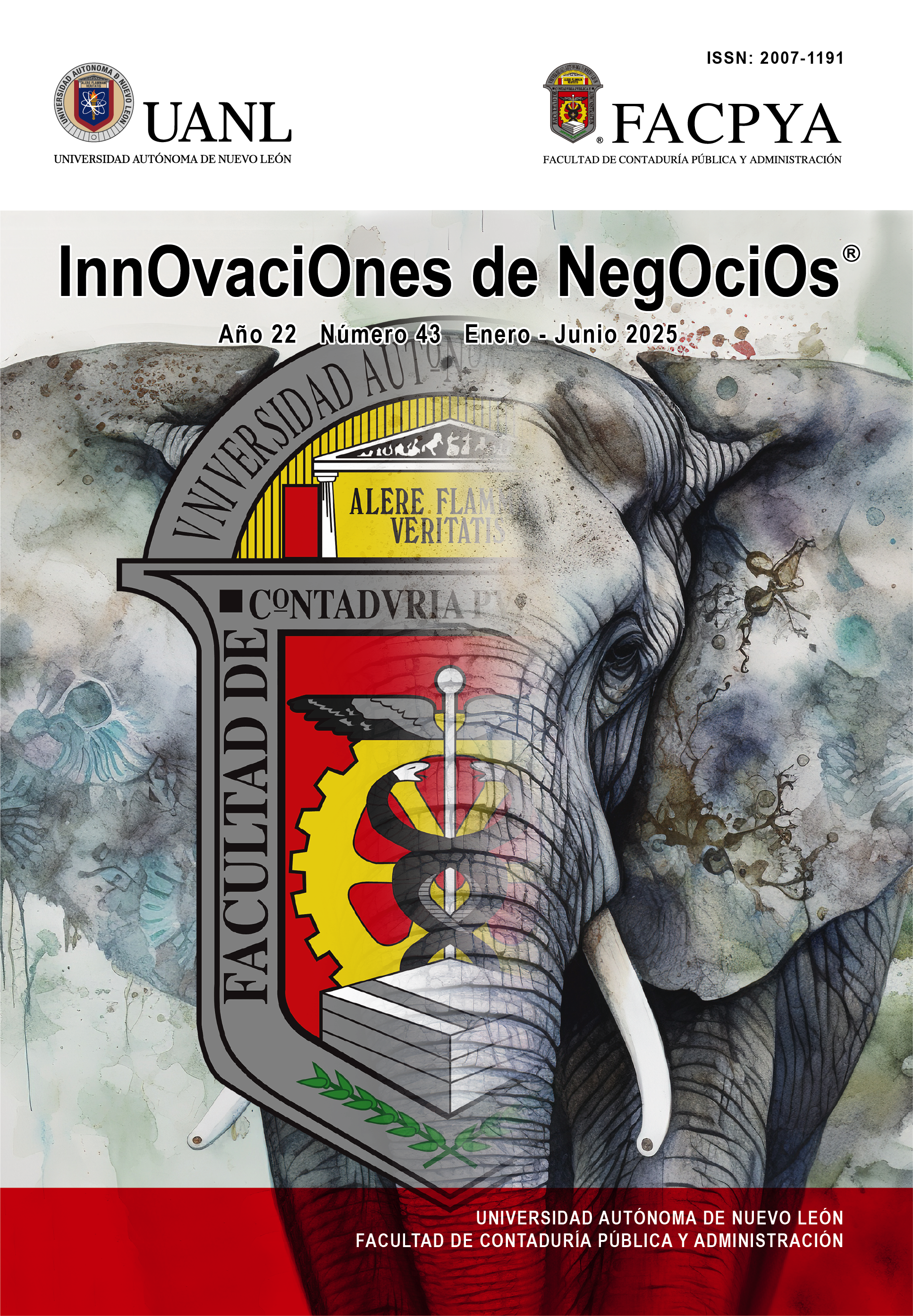en A comparison of some factors that drive entrepreneurial intent among students of a public and a private university in the state of Nuevo León.
DOI:
https://doi.org/10.29105/in22.43-468Keywords:
Desarrollo socioeconómico, Educación superior pública y privada, Emprendimiento estudiantil, Programas de incubación.Abstract
This study investigates the factors motivating entrepreneurship among students from a public and a private university in Nuevo León. It emphasizes that entrepreneurship goes beyond mere business creation, involving a diverse set of skills essential for socio-economic development. The evolution of the entrepreneur concept is analyzed, highlighting their role as strategic managers of resources and key decision-makers. The study underscores the importance of integrating entrepreneurship into university curricula to enhance competencies and foster entrepreneurial activities. Business incubation programs are identified as significant tools in the educational context. The objective is to understand the factors influencing entrepreneurial initiatives among students, crucial for maximizing their impact in both public and private university settings.
Downloads
References
Bedoya, M. A., & Arango, B. (2017b). Orientación emprendedora, recursos y capacidades: Una revisión de su marco conceptual para la innovación. Revista Espacios 38(38), 11–28.
Blanco-Ariza, A. B., Vásquez-García, Á. W., García-Jiménez, R., & Melamed-Varela, E. (2020). Estructura organizacional como determinante competitivo en pequeñas y medianas empresas del sector alimentos. https://hdl.handle.net/20.500.12442/5949
Bojórquez, A. L., y Pavía, G. C. (2011). La innovación tecnológica en las empresas Yucatecas. Red Internacional de Investigadores en Competitividad, 5(1), 501-525 https://www.riico.net/index.php/riico/article/view/583
Borrayo, C., Zepeda, A. V., & Melgarejo, B. D. (2019). Cultura emprendedora en jóvenes universitarios de Guadalajara, México. Revista de Ciencias Sociales, 25(3), 72–87. https://dialnet.unirioja.es/servlet/articulo?codigo=7026735
Cardona, R. A., Martins, I., y Velásquez, H. (2017). Entrepreneurial orientation, assessment and management of projects and Impact in Corporate Entrepreneurship: Intention to Action. Cuadernos de Gestión, 17(2), 37–60. https://doi.org/10.5295/cdg.140511rc
Casson, M (1982) The entrepreneur: An economic theory. Oxford: Martin Robertson.
Casson, M (2010) “Entrepreneurship, business culture and the theory of the firm”. En A. Zoltan y D. Audretsch Editores, Handbook of entrepreneurship research: an interdisciplinary survey and introduction. Estados Unidos de América: Kluwer Academic Publishers.
Covin, J. G., & Miller, D. (2014). International entrepreneurial orientation: Conceptual considerations, research themes, measurement issues, and future research directions. Entrepreneurship theory and practice, 38(1), 11-44. https://doi.org/10.1111/etap.12027
Ejdys, J. (2016). Entrepreneurial orientation vs. innovativeness of small and medium size enterprises.
Finkle, T. A., & Deeds, D. (2001). Trends in the market for entrepreneurship faculty, 1989–1998. Journal of Business Venturing, 16(6), 613–630. https://doi.org/10.1016/s0883-9026(99)00051-8
Frias-Navarro, D., & Pascual-Soler, M. (2022). Research design, analysis and writing of results. Open Science Framework. https://doi.org/10.17605/OSF.IO/KNGTP
Gallegos, R, C. Grandet y P. Ramírez (2014). Los emprendedores de TIC en México: Recomendaciones de política pública para su nacimiento, crecimiento y consolidación. México: IMCO. Disponible en: http://imco.org.mx/wp-content/uploads/2014/05/20140507_Los_Emprendedores_de_TIC_en_Mexico.pdf
GEM, G. E. M. (2013). Global entrepreneurship monitor. Relatório GEM para Portugal, 2013, 2004-2013.
Gomes, G., y Wojahn, R. M. (2017). Organizational learning capability, innovation and performance: Study in small and medium-sized enterprises (SMES). Revista de Administração, 52(2), 163-175. https://doi.org/10.1016/j.rausp.2016.12.003
Granados, E. L. M., Coll, J. A. C., & De la Garza Ramos, M. I. (2019). El fomento emprendedor desde la universidad mexicana. Revista Venezolana de Gerencia, 24(85). https://www.redalyc.org/articulo.oa?id=29058864003
Hair Jr, J. F., Anderson, R. E., Tatham, R. L., & Black, W. C. (1998). Multivariate data analysis 5th ed Prentice Hall Upper Saddle River. NJ. Retrieved from https://www.scirp.org/(S(351jmbntvnsjt1aadkposzje))/reference/ReferencesPapers.aspx
Katz, Jerome A. (2003). The chronology and intellectual trajectory of American entrepreneurship education. Journal of Business Venturing, 18(2), 283–300. https://doi.org/10.1016/s0883-9026(02)00098-8
Kwon, M., y Cho, Y. C. (2017). Investigating effects of entrepreneurial orientation and management on performance: Public vs. private sector. Journal of Marketing Thought, 4(2), 12-25.
Kücükkaban, A. (2016). The impact of entrepreneurial orientation, innovativeness and social capital on firm performance. In, Academic Conferences Association. Proceedings of the 7th multidisciplinary (140- 149). Praga, República Checa.
Lizeth, M. G. E., Alberto, C. C. J., & De la Garza Ramos, M. I. (2019). El fomento emprendedor desde la universidad mexicana.
Mian, S. A. (1996). Assessing value-added contributions of university technology business incubators to tenant firms. Research policy, 25(3), 325-335.
Orlandoni, G. (2010). Escalas de medición en Estadística. Telos: Revista de Estudios Interdisciplinarios en Ciencias Sociales, 12(2), 243-243.
Ramos-Soto, A., Londoño, D., SepulvedaAguirre, J., y MartínezJiménez, R. (2020). Gestión integral e integrada: Experiencia de las empresas en México. Revista de Ciencias Sociales (Ve), XXVI(3), 31-44. https://dx.doi.org/10.31876/rcs.v26i3.33229
Reguant Alvarez, M., Vilà Baños, R., & Torrado Fonseca, M. (2018). La relación entre dos variables según la escala de medición con SPSS. REIRE. Revista d'Innovació i Recerca en Educació, 11(2), p. 45-60. https://doi.org/10.1344/reire2018.11.221733
Robinson, P., & Haynes, M. (1991). Entrepreneurship education in America’s major universities. Entrepreneurship Theory and Practice, 15(3), 41–52. https://doi.org/10.1177/104225879101500304
Robinson, P. B., & Sexton, E. A. (1994). The effect of education and experience on self-employment success. Journal of business Venturing, 9(2), 141-156. https://doi.org/10.1016/0883-9026(94)90006-X
Saeed, S., Yousafzai, S. Y., & Engelen, A. (2014). On cultural and macroeconomic contingencies of the entrepreneurial orientation–performance relationship. Entrepreneurship Theory and Practice, 38(2), 255-290. https://doi.org/10.1111/etap.12097
Shan, P., Song, M., & Ju, X. (2016). Entrepreneurial orientation and performance: Is innovation speed a missing link? Journal of Business Research, 69(2), 683-690. https://doi.org/10.1016/j.jbusres.2015.08.032
Suárez, M., Suárez, L., & Zambrano, S. M. (2017). Emprendimiento de jóvenes rurales en Boyacá- Colombia: Un compromiso de la educación y los gobiernos locales. Revista de Ciencias Sociales, 4, 23–32. https://dialnet.unirioja.es/servlet/articulo?codigo=6478382
Downloads
Published
How to Cite
Issue
Section
License
Copyright (c) 2025 HONORIO GUTIERREZ, Nuria Dianey de Loera Alandro, Alfonso Lopez Lira Arjona

This work is licensed under a Creative Commons Attribution-NonCommercial-ShareAlike 4.0 International License.
The InnOvaciOnes de NegOciOs magazine is a free and open access electronic magazine of a scientific-academic nature and is a publication of the Autonomous University of Nuevo León, in which the authors retain their copyright and grant the magazine the exclusive right to first publication of the work. Third parties are allowed to use the published content, as long as the authorship of the work is acknowledged and the first publication in this journal is cited.
For more information, please contact the Research Secretary (FACPyA) of the Autonomous University of Nuevo León. Telephone: (81) 1340-4430. Email: revinnova@uanl.mx










